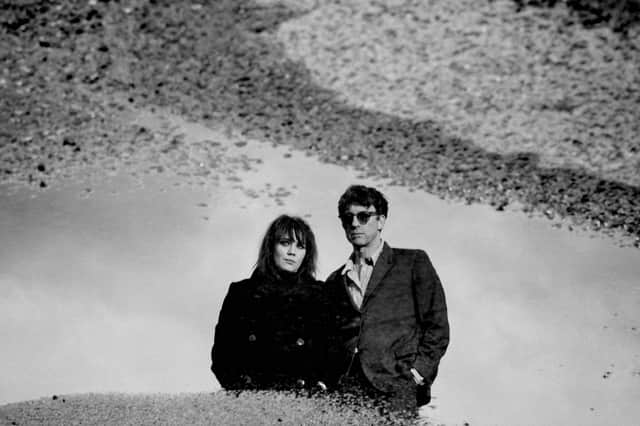Album reviews: The Waeve | Dave Rowntree | Hamish Hawk | LT Leif


The Waeve: The Waeve (Transgressive) ****
Dave Rowntree: Radio Songs (Cooking Vinyl) ***
Hamish Hawk: Angel Numbers (Post Electric) ****
L.T. Leif: Come Back To Me, But Lightly (Lost Map/OK Pal Records) ****
It’s a bumper year for Blur fans, as the Britpop giants reform for a Wembley Stadium bash this summer, and frontman Damon Albarn prepares for the release of Cracker Island, the latest album by his hugely successful Gorillaz collective. But first off the blocks, two of his bandmates debut new work.
Advertisement
Hide AdAdvertisement
Hide AdGuitarist Graham Coxon teams up with former Pipettes singer Rose Elinor Dougall as The Waeve, after initially bonding through a shared love of the darker side of folk music and a need for some purpose coming through the pandemic. There is a sense of liberation in their self-titled debut album, with Coxon blasting away liberally on saxophone, an instrument he hadn’t played for years, and freewheeling song structures which often change direction mid-track.
The Waeve is certainly not a conventional duets album, with Dougall’s classy alto and Coxon’s nasal indie whine only really coming together in punky unison on Can I Call You. More typically, they inhabit their own territory in the song, with Dougall often leading off and Coxon pitching up to wrangle his guitar into the sunset – as on Sleepwalking, where the luxe languor of the saxophone and relaxed motoring of the modular synth give way to a burnished guitar coda, or the legato strings swamping the industrial guitar on Drowning.


Coxon and Dougall are determined to drive the scenic route, taking the listener to places they didn’t realise they wanted to go, including Coxon’s hitherto unexplored skills on the lute. David Bowie is a blatant influence both on the punk/funk saxophone breaks and guitar effects, while the world-weariness of Bowie’s later albums informs the soothing, sultry soundscape of Undine, with Coxon adopting a more wistful tone, not unlike Albarn’s pastoral melancholic moments.
Meanwhile, Blur drummer Dave Rowntree releases his debut solo album at the age of 58, having previously filled his Blur downtime as a TV composer (including scoring CCTV thriller The Capture), lawyer and Labour councillor among other occupations.
Radio Songs is intended to evoke the idea of Rowntree turning the dial until a song or sound emerges from the white noise, such as the gauzy electronic instrumental Who’s Asking, originally composed for film, which closes the album. Along the way, Rowntree applies his hangdog vocals to 1000 Miles, a beautifully arranged meditation on long distance relationships, and confronts his superstitious demons on London Bridge, a moody retro electro pop odyssey with a catchy chorus hookline.
Edinburgh-based indie troubadour Hamish Hawk kicks off the new year with another erudite pop album, stuffed with lyrics to conjure with and emboldened, extrovert outings such as the title track and the motoring Dog-Eared August.


Hawk comes across as a Caledonian Morrissey in the delivery of Elvis Lookalike Shadows, where he imagines the King of Rock’n’Roll communicating with him from the stage of the Comeback Special. He also receives a visitation from baritone bard Bill Callahan on Bill, which is emblematic of the softer, more wistful side of the album.
Advertisement
Hide AdAdvertisement
Hide AdSingers Anna B Savage and Samantha Crain make actual guest appearances, the former cooing over harmonium backing and elegant strings on Frontman, the latter on the sumptuous alt.country flavoured Rest and Veneers.
Come Back to Me, But Lightly is an intoxicating introduction to Glasgow-based Canadian artist LT Leif, who played in a number of Calgary bands before finding their transatlantic home on the Scottish DIY indie scene. The likes of Bill Wells, Faith Eliott, Bart Owl and Woodpigeon’s Mark Hamilton flesh out their beguiling songs, fronted with sensitivity, self-assurance and a cry in their voice, expressed most rapturously on No Birds and with trippy twinkling jazz inflections on Taste of Elastic.
CLASSICAL
Hough, Dutilleux & Ravel: String Quartets (Hyperion) ****
In their memorable 2001 recording, the Belcea Quartet found a refreshing way to recharge the standard coupling by many before them of the Ravel and Debussy string quartets. They added Dutilleux’s exquisite nocturnal Ainsi la nuit, written in 1976, which proved to be the perfect companion piece. The Takács Quartet have gone one step further, dropping the Debussy and adding a characterful new work by newly-knighted pianist Stephen Hough, his Les Six Rencontres, composed specifically to partner the Ravel and Dutilleux. Hough turns to the 1920s Les Six composers – Poulenc, Milhaud, et al – for his inspiration, reinterpreting their mischievous charm, gauche sentimentality and fiery wit in his own sleek hand. The performance sparkles with assertive optimism, and it sits prettily with the Takács’ swirling, iridescent Ravel, and a Dutilleux performance alluring for its pent-up intensity and ethereal, feathery infusions. Ken Walton
FOLK
Duncan Chisholm: Black Cuillin (Copperfish Records) ****
Inspired by both the jagged crags of Skye’s Black Cuillin and Gaelic bard Sorley MacLean’s epic response to them, An Cuilithionn, Highland fiddler Duncan Chisholm embarked on what he describes as “the most ambitious and rewarding project of my creative life”, resulting in this inarguably impressive album. He’s joined by regular collaborators including Jarlath Henderson on uilleann pipes, Hamish Napier on piano and keyboards and Ross Hamilton and Malcolm Jones on electric guitars, as well as a string section arranged by Greg Lawson. They constitute a formidably rich and tight unit, flying together in up-tempo numbers such as On the Winds of Chaos Born or the dramatic Razor’s Edge. Where Chisholm really excels, however, is in his delivery of stately slow airs, matching awe-inspiring landscape with soundscape, as in the magisterial title track, or in the haunting Mìorbhail nam Beann – “the marvel of the mountains”. Jim Gilchrist